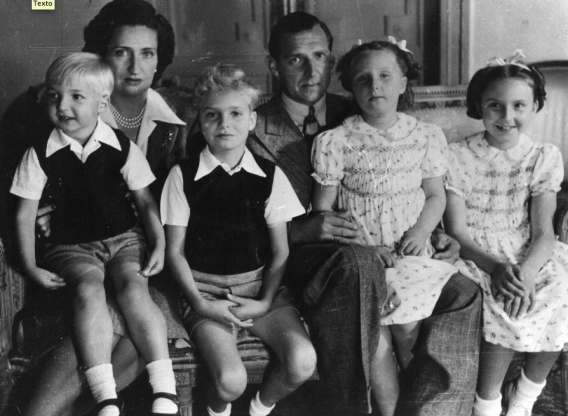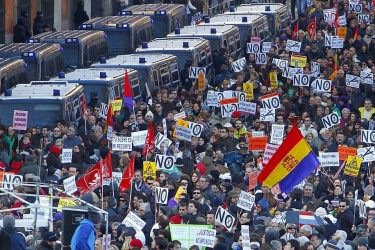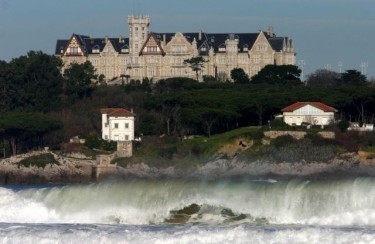In the last few months, numerous scandals have been uncovered in Spain that reveal the extent to which its business and political elite have been pillaging the country's assets and moving the profits to tax havens in which this ill-gotten money remains hidden and idle. At the same time, several scandals [1] [es] have hit the monarchy, causing people to look askance at an institution that until the start of the crisis was mostly well respected in the country.
The latest of these scandals, which El Mundo made public on March 31, has exposed the existence of various Swiss bank accounts under the names of the king of Spain and other members of the royal family [2][es], with a total balance of more than 728 million pesetas, or over 4 million euros.
 [3]
[3]Don Juan and Doña María de Borbón with their four children: Alfonso, Juan Carlos, Margarita and Pilar. Photo from the blog lareinadecorazones.com
According to the paper, these accounts are part of the inheritance that the king's father, Don Juan de Borbón, left to his children, which he would have in part inherited from his father, King Alfonso XIII, who was expelled from Spain in 1931. From then until General Franco's death, the Spanish royal family lived in exile (in France, Italy, Switzerland and Portugal), so in principle it should not be surprising that their assets were held overseas.
What still seems unclear to many Spaniards is why after so many years (Don Juan returned to Spain in 1981 and died in 1993) these accounts remain in Switzerland, when no member of the royal family lives there. Another crumbling story is the supposed “poverty” that the Bourbons lived through during their years in exile, as all historians until now have agreed that Don Juan and his family lived practically on the largess of wealthy monarchists, even encountering financial hardship. As Rogelio Delgado recounts on his blog Otras esquinas [4] [es],
Ricardo Mateos, autor del libro “Estoril, los años dorados”, recibió el testimonio de muchos de los personajes más cercanos al entorno de don Juan y de doña María, todos ellos coincidentes en una afirmación rotunda: “No tenían un duro”
Ricardo Mateos, author of the book “Estoril, The Golden Years,” interviewed many of the people closest to Don Juan and Doña María's circle, all of whom categorically agreed: “They didn't have a cent”
We now know that Don Juan, in his capacity as Prince of Asturias (heir to the Spanish throne), received cash, jewelry, stocks and properties like the island of Cortegada [6] [es], and the palaces of Miramar [7] [es] and La Magdalena [8] [es] after his father's death. According to several authors, these properties should never have been passed to Don Juan because they were given to Alfonso XIII in his capacity as king and not as an individual, and thus belonged to the National Patrimony.
Also unclear to Spaniards is whether the Swiss accounts that are now the property of the king and his sisters have been filed with the Spanish authorities and taxed accordingly. Several political parties have requested information about these accounts from Parliament [9] [es], although the Department of Finance asserted that:
(…) el Ministerio de Hacienda está sujeto a la ley general tributaria, que no permite difundir datos de obligados tributarios, y una pregunta parlamentaria tampoco permitiría saltarse esto.
… the Department of Finance is subject to the tax code, which does not allow the dissemination of taxpayer data, and even a parliamentary request would not permit us to bypass that.
The opacity surrounding the royal family's finances and the fact that the monarchy falls outside of the future transparency law put forth by the government seems to be increasingly irritating the Spanish people and doing great damage to the institution, which neither the government nor the royal family seem able to perceive, and the consequences of which are difficult to predict.
The people's anger can be seen in the comments left under this story in various news sources. In La república [10] [es], Sento [11] comments:
¿Alguien esperaba otra cosa de esta tropa?
Did anyone expect anything different from this bunch?
In El mundo [12] [es], BENITOPITO says:
“monarquía corrupta e insensible con los dramas sociales de los ciudadanos” ___ esta frase resume muy bien lo que está pasando desde hace bastantes años. La jugada de la democracia fue muy oportuna y muy oportunista, pero cuando se vio el blindaje económico, político y de responsabilidad penal de la familia real, entonces caímos en la cuenta de cómo habían jugado con nosotros, que somos más de 40 millones, y durante casi 40 años. (…)
“a corrupt monarchy that is numb to the social catastrophes of its citizens” ___ this sentence summarizes well what has been happening for many years. The move toward democracy was very opportune and very opportunistic, but when the shield surrounding the economic, political and criminal liability of the royal family became clear, then we realized how they had played us, we who are more than 40 million strong, for almost 40 years….
In the same paper, parmenides64 says:
Pues no esta tan mal la herencia para una persona a quien no se le conoce haber tenido un empleo en su vida.
Well not such a bad inheritance for someone who is not known to have ever held a job in his life.
On Twitter, Miquel A Soler Neira [13] writes:
@MASolerNeira [14]: Si el dinero en Suiza es de una herencia y en 20a [años] no has reparado en traerlo al país del que eres Rey, no pasa nada, no?
@MASolerNeira [14]: If the money in Switzerland is from an inheritance and in 20 years you haven't brought it into the country in which you are King, no big deal, right?
Francisco Guerra Caballero and Felipe J. González commented on elplural.com [15] [es]:
 [16]
[16]Republican flags waved during a protest against banks. Photo from Facebook page «Alternativas a la banca tradicional.»
Francisco Guerra Caballero:
Y todo eso sin tributar en españa ni un solo centimo, pero para eso estamos los currantes de este pais para levantar un imperio en nombre de los borbones.
Francisco Guerra Caballero:
And all this without paying even a single cent in taxes to Spain, but for that we are this country's workers who have raised an empire on behalf of the bourbons.
Felipe J González:
Conducta ejemplar, preconizaba aquí el Juan Car en el palique de fin de año.. Hay que tener mucho temple, que diría Watson.
Felipe J González:
Exemplary conduct, Juan Car called for here in his end of year chat.. One must have mettle, as Watson would say.
In the light of these developments, more people are calling for the abdication of King Juan Carlos, whom some already consider obsolete. Of these voices, the monarchists support abdication in favor of his son Felipe, but the number of Spaniards who claim the right to elect their head of state through a democratic system is growing. As has been the case at various points in Spain's history, at times the future of the monarchy seems dim.
